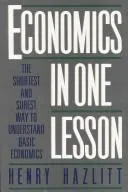1
mention
mention

The main thesis of this book is that the economy is a complex dynamical system and government's efforts to tamper with a free market economy is a game of whac-a-mole where a variety of hard-to-see n-th order (n>1) negative consequences dominate the intended easy-to-see positive consequences, resulting in an overall net loss for everyone. This thesis is illustrated with the use of few dozen example settings per chapter that are seemingly different (e.g. tariffs, rent control, unions, minimum wages, government infrastructure projects, technological creative destruction, price fixing, savings, etc), but are in fact argued to be instances of the same general pattern and the same recurring fallacies. If you already share the philosophy (e.g. you like Austrian school of economics, libertarian philosophy, capitalism, Ron Paul, and you worship the free market as the ultimate decentralized planning and allocation system), and you already have a working knowledge of economics then this book will supply you with a lot of additional ammunition of examples and arguments for fighting your socialist or keynesian friends. You’ll love it and walk away with an even peakier posterior over your mastery of economic philosophy. Unfortunately I do have to critique the book in some respects: - It does assume quite a bit of economics knowledge that it does not bother to explain sufficiently, leaving me a little perplexed in some sections. i.e. this is not a textbook. More worryingly, - The author just can’t hold back his feelings and resorts to ad hominem attacks too frequently, multiple times citing unidentified individuals that have clearly caused him a lot of emotional pain as too stupid to understand his very basic lesson. These attacks add nothing. I was strongly reminded of Richard Dawkins’ related and unfortunate tendency to mock those who do not accept what he views as self-evident. - The book is, as is often the case, a very one-sided account of the central thesis, frustratingly lacking in any hints of counterexamples or uncertainties. For example I would have loved to see the discussion at least touch on, e.g. wealth distribution inequality and the related and tightly coupled inequality in power, externalities, social darwinism, historical precedents of government projects (e.g. atom bomb, space program, etc), etc. In summary, I enjoyed the book overall but I was hoping for less of a "I have it all figured out, look it’s so elementary, and there are no good arguments to the contrary" vibe and a more complete treatment of the topic (and preferably without ad-hominem attacks for bonus points). Still an overall recommended read. 4/5
— Andrej Karpathy
2016-05-16 on goodreads.com